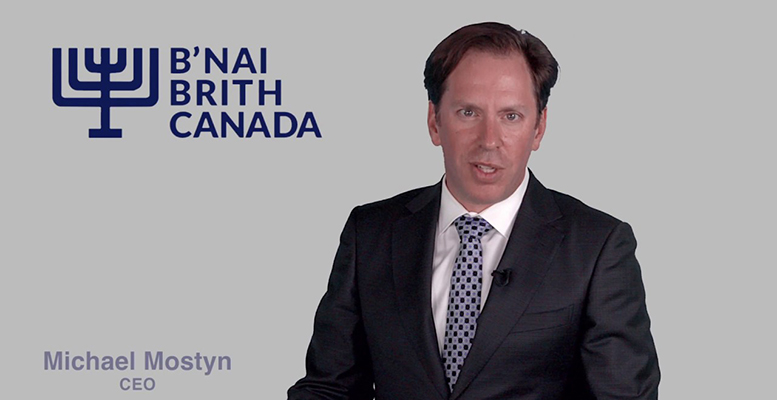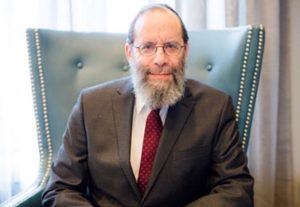The CEO of B’nai Brith Canada, who took over a debt-riddled non-profit and revitalized it into one of the country’s leading Jewish advocacy groups, died Feb. 4 of brain cancer. He was 50 years old.
Soon after he took on the top job, Michael Mostyn began to turn the 150-year-old organization around. The organization’s heavily mortgaged office building in Toronto was sold, as was an Alzheimer’s care facility.
B’nai Brith’s free weekly newspaper, founded in 1964 as The Covenant and later renamed the Jewish Tribune, was also closed as part of the overhaul in how the organization handled communications.
“We’re great at affordable housing. We’re fantastic at standing up for human rights and fighting antisemitism, fighting bigotry, putting on programs to help the least fortunate in our community” Mostyn told The CJN in 2016.
“So, it’s a matter of prioritizing, which we did, and [we’re] really going through a process of reinvention for the next generation.”
Mostyn was awarded the Queen Elizabeth II Diamond Jubilee Medal and the King Charles III Coronation Medal, for his advocacy on behalf of the Jewish community and marginalized groups.
At an overflowing funeral on Feb. 5 at Benjamin’s Park Memorial Chapel in Toronto, politicians and colleagues testified to the impact he had.
“He was front and centre in leading the efforts to have Iran’s IRGC (Islamic Revolutionary Guard Corps) listed as a terrorist organization, and for provinces and cities to adopt the IHRA definition of antisemitism,” said Toronto city councillor James Pasternak in his eulogy.
“Michael was a regular at city hall deputing on important issues at the various committees, joining us at times of celebration of Israel, Jewish holidays and remembrance and reaching out to elected representatives of all three levels of government to spread the important message of watching for the dangers of hate and the scourge of antisemitism.
“He was not afraid to call out those in society who would incite and give speeches of hate. He praised police when the job was well done, but pointed out when there was work to be done.”
Reflecting on cherished memories of collaborating with my good friend, Michael Mostyn. He was a mensch, a person of wisdom, optimism and strength. He put all his energy into his family and community, ensuring we had a safer, more hopeful Canada. He will be greatly missed by many. pic.twitter.com/JbTTIJmEqs
— James Pasternak (@PasternakTO) February 5, 2025
Mostyn ran for the federal Conservatives in 2004 and 2006, and for the Ontario PCs in 2011 in the riding of York Centre, but was not elected. It was through campaigning that he met Michael Levitt, the former Liberal MP for the riding who is now the head of the Jewish advocacy organization, Friends of Simon Wiesenthal Center.
“Even though Michael and I were playing on different teams in the political arena, we hit it off right away,” Levitt said in his remarks at the funeral. “We both shared a strong commitment to the Jewish community and to Israel.
“I remember him coming to Parliament to brief MPs each year on the B’nai Brith’s annual audit of antisemitism in Canada. Everybody in Ottawa on both sides of the aisle knew just how strong and driven he was. He commanded great respect on Parliament Hill.”
Absolutely heartbroken by news of my friend Michael Mostyn's passing. Michael was strength personified when it came to advocating for our Jewish community and his leadership at B'nai Brith Canada was inspiring. I will miss our walks and our chats and just spending time together.… pic.twitter.com/OaoPbpuEW0
— Michael Levitt 🇨🇦🎗️ (@LevittMichael) February 4, 2025
Born and raised in Toronto, to parents Sheila and Alan, Mostyn studied law and joined his father and brother in the family law firm.
“And then B’nai Brith called for him and he left me, but it was a good move, I couldn’t afford him. He was a great lawyer,” his father said.
He served as B’nai Brith’s national director of public affairs in Ottawa from 2006 to 2010. He then joined a high-tech firm as chief strategic officer in 2012—but he soon returned to B’nai Brith.
As the CEO, he turned the organization’s efforts to confronting antisemitism, which included inviting a politician who made negative remarks about Jews to join him at a kosher restaurant for conversation.
“The politician loved the food, and more importantly he became a friend and supporter of B’nai Brith,” said Marty York, a veteran sports journalist who Mostyn hired as communications director in 2016. “Michael provided him with a clearer understanding of our community’s concerns and some of the politician’s votes would reflect what Michael outlined to him.”
Before getting his career underway, Mostyn took improv comedy classes at Second City, and spent time studying film in Los Angeles, recalled his friend Mark Arbus.
The performance skills proved useful in his CEO role, like when B’nai Brith promoted the film Wish You Weren’t Here, which focused on the anti-Israel views of Pink Floyd founder Roger Waters.
During a 2017 concert in Toronto, Waters paused his show to call out Mostyn by name.
Mostyn was delighted, telling The CJN at the time “We’re very proud that he singled out B’nai Brith, because first of all, it means he took note of our campaign.
“He’s taking note of these film screenings that are taking place across the country, coinciding with his shows across the country, and it shows that it’s having an impact and that this campaign is very effective.”
Mostyn’s friends savoured the moment as well, Arbus said at the funeral.
“We thought it was amazing too. We still watched the video often,” Arbus said, referring to the close group of childhood and university friends who were like a second family to Mostyn.
In his last weeks, numerous politicians, friends and colleagues called Mostyn to reminisce, said Rabbi Moshe Steiner. One of those who called was Conservative leader Pierre Poilievre who recalled the deft way that Mostyn managed to divert an overly talkative stranger at a diner.
Conservatives send our deepest condolences to the family and friends of Michael Mostyn.
— Pierre Poilievre (@PierrePoilievre) February 4, 2025
Michael was a true mensch who dedicated his life to fighting antisemitism, including as CEO of B’nai Brith Canada.
May his memory be a blessing.
Rabbi Steiner also recounted a call from Rabbi Chaim Mendelsohn of Chabad in Ottawa. Mostyn wanted to erect a sukkah on Parliament Hill, but didn’t have any of the required permits and permissions.
Mostyn and Rabbi Mendelsohn nonetheless took boards and tools to the Hill and were starting to build a sukkah when the RCMP approached and began asking questions. Mostyn had such confidence, that even the RCMP began to agree that a sukkah could be built there, Rabbi Steiner said.
Drawing a comparison to the Lubavitch Rebbe, Menachem Mendel Schneerson—with whom Mostyn shared a Hebrew name—Rabbi Steiner continued, “Michael had the confidence to bring Jewish pride to the public sphere in halls of power; like the Rebbe, Michael was not afraid to go against the grain and was vindicated time and again.
“Like the Rebbe, Michael had boundless faith and optimism, even when things did not appear to be good at all.
“Like the Rebbe, Michael was never too small to do big things and never too big to do small things.”
Michael Mostyn is survived by his wife Ella, his children, Benjy and Bella, his parents Alan and Sheila; his sister, Sari Rudick and brother Matthew, and nieces and nephews.







